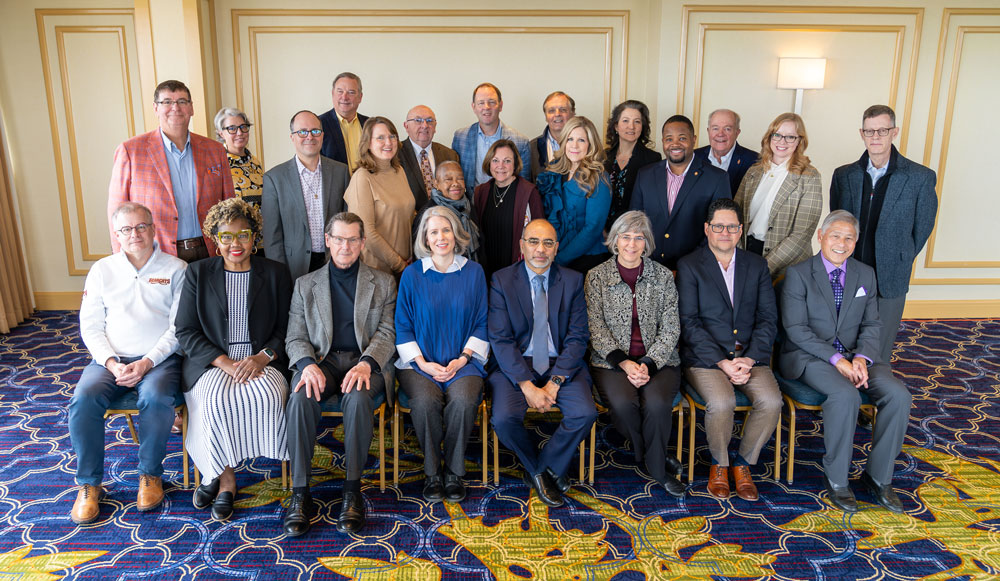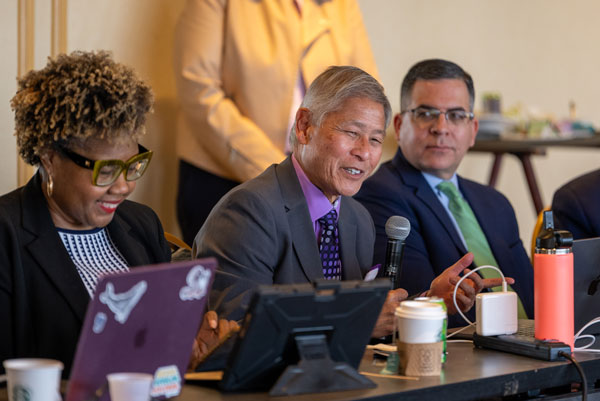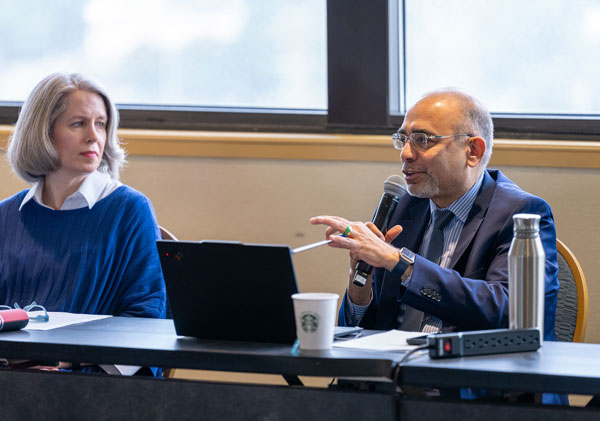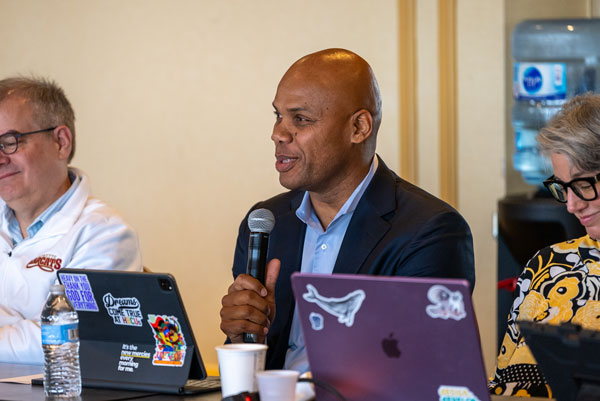University Senate Meets for First Session of New Quadrennium

The University Senate of The United Methodist Church met Feb. 10-11 in Atlanta for its first meeting of the new quadrennium.
The University Senate of The United Methodist Church met Feb. 10-11 in Atlanta for its first meeting of the new quadrennium. Senators from Methodist-related U.S. academic institutions meet twice a year to ensure standards are maintained across church-related institutions in areas such as church-relatedness, program quality, financial integrity, stewardship and governance.
“The University Senate of The United Methodist Church sets and maintains the standards of United Methodist-related education,” said Roland Fernandes, general secretary of the General Board of Higher Education and Ministry, in his opening remarks. “Our work today is vital as we ensure that United Methodist-related institutions are upholding the values of our church while fostering academic excellence,” Fernandes continued, underscoring the critical role the senate plays in shaping the future of Methodist-related education.
Fernandes denounced efforts to dismantle the U.S. Department of Education and noted rising concerns about immigration enforcement on campuses. He noted that scholarships for underserved students are under threat and presidents are receiving pleas and pressure from students asking for protection from anti-LGBTQIA and anti-immigrant executive orders.
“Education teaches us how to build bridges between diverse communities and advocate for public policies that embody compassion, justice, and the inherent worth of every person,” he said. “For these values and others, I am committed to building a future where the church and the academy collaborate for a more compassionate and just society, where empathy prevails regardless of passport status.”
In recent years, the University Senate’s task has become less one of accreditation and more one of review for the way in which an institution is, in fact, related to The United Methodist Church. University Senate President Susanna Baxter, president of LaGrange College, emphasized members’ role in setting standards and ensuring the integrity of United Methodist-related institutions.
“We set the course for how the U.S. would consider accreditation with the work that we did,” Baxter said. “So, it matters from a quality perspective. If we say it’s United Methodist, we mean there’s a certain standard attached to that.”

Grant Hagiya, President, Claremont School of Theology, speaks to the group. Candace Lewis, President-Dean, Gammon Theological School (left) and C. Todd Willis, Chief Operations Officer / General Counsel of GBGM (right), listen.

Roland Fernandes, general secretary for the General Board of Higher Education and Ministry, addresses the University Senate. Senate President, Susanne Baxter (left), president of LaGrange College, listens.
Senators discussed the responsibility to ensure the alignment of United Methodist institutions with the seven marks of an institution and a meaningful relationship outlined in the senate’s guidelines for United Methodist schools, colleges and universities. They are:
- A United Methodist-related institution fosters a culture of service among its students, faculty, and staff that encourages engagement in the Wesleyan tradition.
- A United Methodist-related institution recognizes The United Methodist Church’s Social Principles; creates a community of scholarship and learning which facilitates social justice; and is committed to actions and initiatives promoting justice, solidarity and equity among all people (BOD, ¶¶ 160-164).
- A United Methodist-related institution respects, honors and provides the scholarly teaching of religion and especially the teaching of the Christian tradition as it relates to other living world religions to foster interfaith leadership on campus and in the community. In the case of professional institutions and programs, the curriculum includes opportunity for faculty and student reflection on the ethical dimensions of professional practice.
- A United Methodist-related institution respects and honors religious practices for people of faith and, specifically, worship and service for faculty, staff and students who choose to participate in religious traditions within the total life of the institution.
- A United Methodist-related institution encourages faculty, staff and students to explore the place of religious belief and practice, as well as the intellectual dimensions of religious faith in academic disciplines and co-curricular activities; and advocates for the appropriate recognition of the contributions and challenges of religion in the public square.
- A United Methodist-related institution includes in its faculty, administrative officers and board of trustees persons who understand and respect the relationship with The United Methodist Church.
- A United Methodist-related institution identifies itself as such in marketing materials, official listings and other statements of self-description.
Senate members spent time discussing upcoming review visits for Methodist-related schools, colleges and universities, orienting new members to key responsibilities of their role.
Baxter also highlighted the importance of the senate’s work in providing financial support for these institutions, noting some conferences provide funding based on senate-approved standards. “It also matters that students have access to scholarship dollars through The United Methodist Church and the United Methodist Foundation to attend our institutions,” Baxter said.
The United Methodist Church’s commitment to education is rooted in the vision and actions of its founder, John Wesley. Wesley encouraged intellectual development alongside spiritual growth. He worked to connect “knowledge and vital piety,” relate faith and reason, and educate the whole person in body, mind and spirit.
The next University Senate meeting will be held jointly with the North American Association of Methodist Schools, Colleges and Universities (NAAMSCU), June 18-19, in Detroit, Michigan.

of a Methodist-related institution by a University Senate review team.
The University Senate
The University Senate, comprised of 27 members from Methodist-related U.S. academic institutions, meet twice a year to ensure standards are maintained across church-related institutions in areas such as church-relatedness, program quality, financial integrity, stewardship and governance. Learn more about the University Senate.
Related Posts
For Priscille Hassa Malandji, a Master of Divinity student at Drew University Theological School, receiving a 2025-2026 General Board of Higher Education and Ministry (GBHEM) scholarship has been more than financial relief — it’s a confirmation of her calling.
What begins on Ash Wednesday culminates with Good Friday. This period is meant to be a time of self-reflection, repentance, and sacrifice. The purpose of Lent is to help us think deeply about our lives. How is our soul? How is our heart? How are we moving closer to our ideal self? Is our love growing? Are we holding grudges? Are we ready to forgive?
Rumi was a Muslim mystic who lived in Turkey in the 13th century. His poems are about the primacy of love. ... This poem is an invitation to help lift one another, because as we do so, we are also lifting the world. This poem has been translated by Farideh Azodi Davidson.







